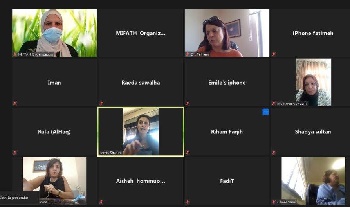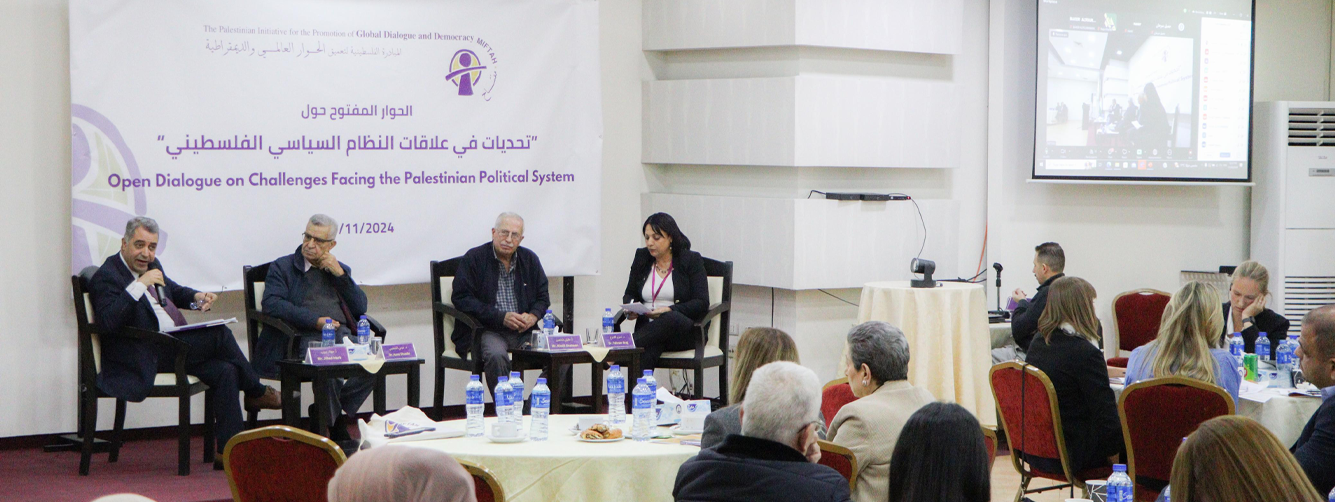
Ramallah – On October 20, MIFTAH held a zoom session to showcase the results of its study, which monitored and documented Israeli human rights violations against Palestinian women during the state of emergency imposed during the coronavirus pandemic. The study was conducted in the districts of Jerusalem, Hebron and the Jordan Valley and include violations resulting from Israeli military measures and settler violence.
The study highlighted three factors categorizing these targeted areas: the colonialist settlement regime; the social and cultural patriarchal system and its relation to the colonialist regime; and the marginalization of these areas from various aspects including the most recent factor, which is the coronavirus pandemic.
Interventions
All of the interventions in the session called for a plan to protect women in seam zones most affected by these violations, in addition to lobbying and advocacy campaigns to provide health care services to women and girls in these areas, which suffer from meagre Ministry of Health services. This is attributed to a number of factors related to the Israeli occupation and settlement expansion and the lack of support and international funding for programs and health services in these areas. They considered the report an opportunity to shed light on the situation of women under occupation during the pandemic, to be used in early warning measures for linking these issues to Israel’s violations and to the need to hold the occupation and settlers accountable. They also called for including the study’s recommendations in the action framework for implementing the UNSCR1325 National Action Plan as follow up and implementation and for exclusivity for marginalized areas in terms of protection, services and alleviating the everyday hardships and challenges facing Palestinian women under occupation. In particular, the interventions pointed to Palestinian areas threatened with confiscation, annexation and population displacement.
Presentation
Dr. Nader Said and the Arab World for Research and Development (AWRAD) team, commissioned by MIFTAH for the report, presented the highlights of the study. He addressed the political developments pertaining to Israel’s systematic policies of expansion, annexation and attempts to take over more Palestinian land amid Israel’s continued violation of international agreements and refusal to abide by international laws and human rights treaties. The report also broached the Israeli occupation’s ongoing violations against the Palestinian people in general and against women and children in particular, which has had an adverse impact on women in terms of their access to resources and curtailed ability of movement and free choice.
The study showed that all areas under control of or in direct contact with Israeli soldiers or settlers, especially areas the Israeli government is threatening to annex, suffer from a lack of economic, educational and political opportunity and prosperity. It said that throughout the pandemic, there has been a concerning increase of violence against Palestinians, whether by Israeli occupation forces or settlers. This period also saw an increase in arrests in spite of the spread of the virus and the state of emergency in place.
The study ascertained that the lockdowns, Israeli checkpoints and the cuts in medical referrals to hospitals in Jerusalem all put pregnant women and newborns at risk. These restrictions increased during the state of emergency mostly under security pretexts, which had a major impact on the people’s ability to move freely, reach their workplaces and access health and educational services in addition to receiving humanitarian aid. Moreover, due to Israel’s restrictions to curb the spread of Covid-19, some landowners behind the separation wall or near settlements were unable to obtain permits allowing them to reach their land. Others were denied access because of the closure of gates in the separation wall or when permit-holders were prevented from reaching their workplaces [inside the Green Line]. This had an adverse effect on production and therefore, their livelihood. The state of emergency coincided with discussions on the annexation of West Bank areas to Israel while concomitantly seeing the highest average of demolitions in the past four years. These demolitions included not only homes but water, sewage and sanitation facilities, agricultural structures and others, which impacted the ability of Palestinians to access these services.
Results
The study concluded with the following results: 99.6% of women participants in the study (sample of 245 women) have been subjected to assault, prevention, violation or harassment by Israeli occupation forces or settlers during the state of emergency; 69% of women saw an increase in Israeli violations and settlement attacks; 81% of women were subjected to restrictions on movement in reaching basic services; 74% of women in the Jordan Valley have been subjected to assaults on their properties while 95% of women said the violations made them more vulnerable to the risk of abortion. Furthermore, 89% of the women said the closure of their areas negatively impacted their ability to reach clinics and hospitals for treatment, while 98% said the lockdowns and Israeli violations negatively impacted the ability of preventative medicine teams and the Ministry of Health from maintaining a presence in their areas. Israeli violations, furthermore, negatively impacted the livelihood of 93% of women and their families and Israeli closures in their areas had a negative effect on the ability of 91% of women to secure sufficient funds.
Recommendations
The study also produced a number of recommendations including: the need to develop clear interventions by official, international and civil society parties in order to find ways to support these sectors and promote their endurance on the land against Israeli military violations and settler attacks; to continue documenting violations against Palestinian women by occupation forces and settlers in all areas; increasing efforts to adjust UNSCR1325 in harmony with the Palestinian situation; and to hold Israel accountable for violations against women in Palestine.
This session was held as part of MIFTAH’s interventions to support efforts in implementing the WPS agenda in Palestine and within its OXFAM-funded “Conflict and Fragility” project.








